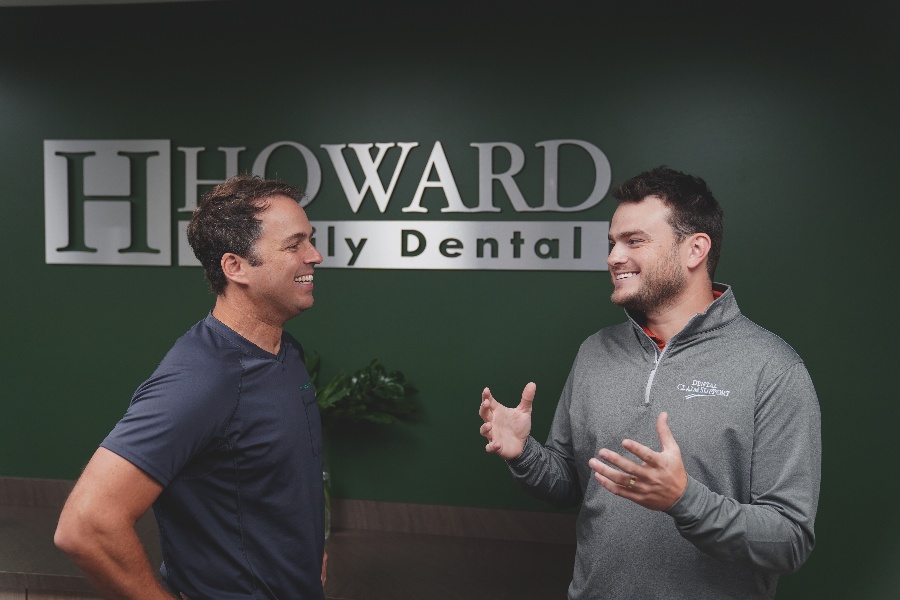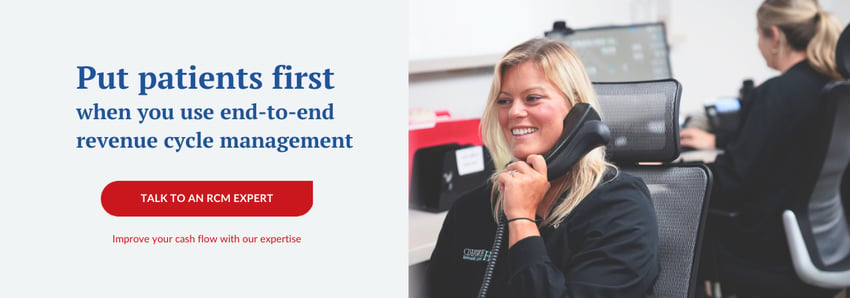3 potential roadblocks to discuss with your dental billing company


You’re a dental professional ready to sign on with a dental billing company. You keep hearing all the amazing benefits of outsourcing your dental billing process, and you’re ready to increase your revenue.
But as you prepare to make this choice, you need to discuss potential roadblocks with the dental billing company of your choice. Why? Because it will help set you up for success.
It sounds kind of backward, but discussing potential roadblocks before they happen can help both your team and your dental billing company maintain expectations of what results to expect from the biller’s work.
As a full-service dental billing partner, we’ve seen these roadblocks at DCS between teams and billers. Starting a new partnership will always present at least a few challenges as you transition, but the benefits you receive are well worth it. That’s why these potential challenges should be discussed ahead of time so that you and the dental billing company can be on the same page, and take steps to prevent these roadblocks.
In this article, we’re sharing 3 potential roadblocks to discuss with your dental billing company. Through our years of experience working with dental teams to create easy revenue collection, we’ve seen how these kinds of open and honest discussions can lead to success from both parties. After you read this article, you’ll know what you should address with your dental billing company in order to ensure a smooth transition and financial success.
1. Your insurance aging report may not get down to 10%
There are many things that will affect the results your dental billing company can produce for you.
The ideal insurance aging report is at around 10% or lower. With this number in mind, we’ve seen dental teams fixate on this percentage and become frustrated when it is not reached by the outsourced dental billing company.
Typically, this is because of two reasons:
1. The dental insurance company is doing what insurance companies do - finding hyper-specific reasons to not pay on your claim. Your biller is likely doing what they can to resolve this issue, even asking their fellow billers for assistance on it. But every now and then, dental insurance will not budge on paying on a claim.
2. The team member responsible for creating the initial insurance claim repeatedly inputs incorrect information on the claim. This results in reimbursement denial by the insurance company. And if this happens enough times, that insurance aging report is going to keep growing. And while the biller can work to appeal the claims, that percentage is not going to get down to 10% if the team member creating the claim does not adjust their creation process.
We don’t say these things to place blame. Dental insurance billing is difficult, and that’s why you’ve outsourced your billing in the first place. And while you can count on the fact that insurance billing experts are working on your claims, trying to see them through until they are paid, there are factors that they cannot control. And these factors can prevent your insurance aging report from coming down.
Related: Dental claims service: 3 factors that affect a practice’s results
It’s important to keep the perspective that your biller is doing everything they can to get your insurance claims paid, but there are always going to be outside factors at play. And a lot of the work your outsourced billers do is affected by the work your in-house team does.
Let’s get more into that.
2. The work your team does will reflect how well your dental billing company can get you paid
Although you have outsourced your billing process, specifically the more complicated tasks in the billing process - your team will still have a few billing responsibilities. And your team completing these tasks will affect the work your outsourced billing team is able to do.
For example, your team will still be responsible for creating a patient’s insurance claim. So, you will collect the patient’s information needed, and after their treatment, your team will attach any clinical documentation needed for the insurance claim to be reimbursed. The outsourced biller will then take that claim and submit it to the proper insurance company for you, and follow through with it until it is paid.
If your team inaccurately completes the insurance claim, and the outsourced biller submits it and receives a denial, the biller will have to do extra work to get that claim appealed. This will slow the rate at which your insurance collections and insurance aging report numbers improve.
It’s a symbiotic relationship. Both parties need one another! So, your team creates accurate insurance claims and the outsourced biller takes it from there. So while neither party can really control what the insurance company is going to do, you can control the work your in-house team puts into creating accurate insurance claims.
Communicate who is responsible for what so that there is no confusion, and you can avoid this roadblock. And it will lead to your financial success.
3. Your team might have a hard time adjusting to working with the biller
Another common potential roadblock for a team working with a dental billing company is the transition that comes with it.
Your in-house team will have a huge load taken off their plate with the outsourced biller handling the behind-the-scenes, tedious billing work. And although this should come as a relief, some team members might have a hard time adjusting. Working with an outsourced biller is like adding another member to your own dental team, in a sense.
They work on your claims or patient billing, advocate on your behalf to the insurance companies, and are incentivized to get your dental practice paid.
However, your in-house team might struggle with the change because it’s an extra person to communicate with. And while you don’t have to email back and forth with your biller all day, there are times when you do need to be available to answer questions for them - typically the answers to the questions help you get paid!
Related: 10 tips to help your dental team accept the change to outsourcing
Plus, if the person who was previously responsible for your billing before has now handed it off to the outsourced biller, they might feel particular about how it is handled. So give your team time to adjust to the change of outsourcing your dental billing. But plan to continue to have conversations about it with your team AND your outsourced biller. This way everyone stays on the same page, and the transition is smoother.
Ready to work successfully with a dental billing company?
Communication is key. And when you start a new partnership with a dental billing company, conversations about expectations are crucial. And this includes any potential problem you might anticipate. It is important for your success that you discuss topics like what results you expect, your team's role in achieving those results, and the transition into working with a billing company.
DCS is a revenue resource for dental teams looking for a worry-free dental billing process. Our billers are always ready to discuss topics like the ones mentioned in this article in order to create your financial success.
To learn more about working and communicating successfully with a dental billing company, schedule a call with one of our experts.
Related Posts
Dental revenue resources from Dental Claim Support


